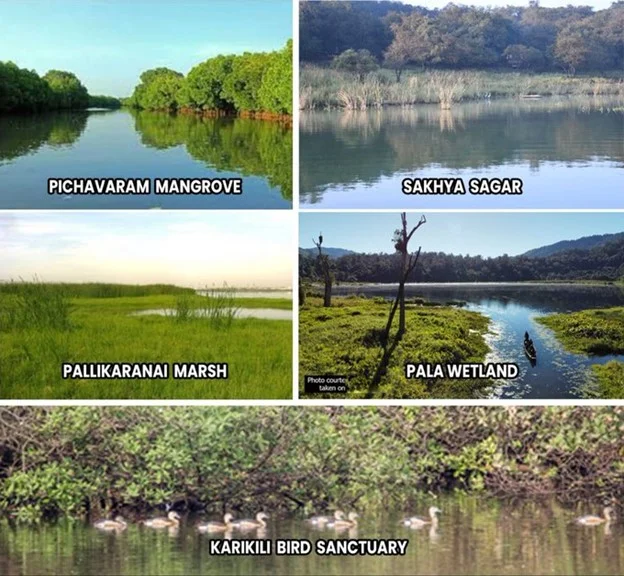Environment & Ecology
In News: India has added five more Ramsar sites, or wetlands that are of international importance, bringing the number of such sites to 54.
- These are the Karikili Bird Sanctuary, Pallikaranai Marsh Reserve Forest and Pichavaram Mangrove in Tamil Nadu, the Sakhya Sagar in Madhya Pradesh and Pala Wetland in Mizoram.

Wetlands
- Wetlands are an area of marsh, fen, peatland or water; whether natural or artificial, permanent or temporary, with water that is static or flowing, fresh, brackish or salt, including areas of marine water the depth of which at low tide does not exceed six metres, but does not include river channels, paddy fields, human-made water bodies/ tanks specifically constructed for drinking water purposes and structures specifically constructed for aquaculture, salt production, recreation and irrigation purposes.
- To be Ramsar site, however, it must meet at least one of nine criteria as defined by the Ramsar Convention of 1961.
Wetlands in India
- India’s Ramsar wetlands are spread over 11,000 sq km — around 10% of the total wetland area in the country — across 18 States.
- No other South Asian country has as many sites though this has much to do with India’s geographical breadth and tropical diversity.
- The United Kingdom (175) and Mexico (142) have the maximum Ramsar sites whereas Bolivia spans the largest area with 148,000 sq km under the Convention protection.
- Wetlands are also known to have among the highest soil-carbon densities and therefore play a major role in buffering carbon dioxide emissions.
- The National Wetland Inventory and Assessment compiled by the Indian Space Research Organisation, estimates India’s wetlands to span around 1,52,600 square kilometres which is 4.63% of the total geographical area of the country.
- India has 19 types of wetlands whereas Gujarat has the maximum area followed by Andhra Pradesh, Uttar Pradesh and West Bengal.
- Wetlands in Uttar Pradesh and Gujarat serve as important spaces for migratory birds.
Significance
- Being designated a Ramsar site ensure States and the Centre take steps to keep these tracts of land are conserved and spared from man-made encroachment.
- Acquiring this label also helps with a locale’s tourism potential and its international visibility.
Source: Pib.Gov
Previous Year Question
Q.1) Consider the following pairs: (2022)
Wetland/Lake: Location
- Hokera Wetland Punjab
- Renuka Wetland Himachal Pradesh
- Rudrasagar Lake Tripura
- Sasthamkotta Lake Tamil Nadu
How many pairs given above are correctly matched?
- Only one pair
- Only two pairs
- Only three pairs
- All four pairs
Q.2) “If rainforests and tropical forests are the lungs of the Earth, then surely wetlands function as its kidneys.” Which one of the following functions of wetlands best reflects the above statement? (2022)
- The water cycle in wetlands involves surface runoff, subsoil percolation and evaporation.
- Algae form the nutrient base upon which fish, crustaceans, molluscs, birds, reptiles and mammals thrive.
- Wetlands play a vital role in maintaining sedimentation balance and soil stabilization.
- Aquatic plants absorb heavy metals and excess nutrients.











